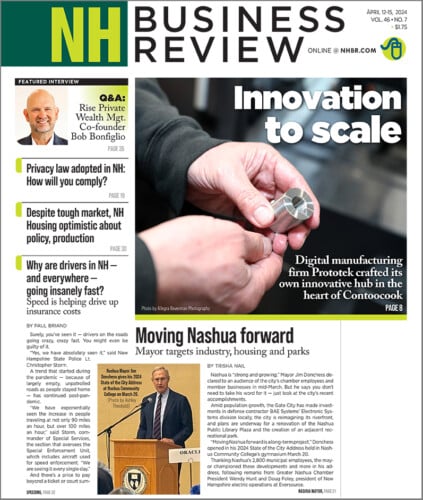From avid skier to ‘Super Lawyer’
Dick Samuels’ contributions to New Hampshire as an attorney with McLane Middleton can be credited to skiing.
Samuels earned his bachelor of arts degree from Union College in New York and a master of arts from Duke University in North Carolina. Then, he hit the slopes.
“After college I worked and skied in Switzerland and at Mad River Valley in Vermont,” he said, but adds, “To make a living and ski is hard to do working on bindings in a ski shop.”
So Samuels went to law school, receiving his degree from Cornell Law School in 1980. He intended to return to Vermont but since New Hampshire’s economy was much stronger than Vermont’s, he settled in the Granite State, joining McLane Middleton in 1980.
“I figured, ‘What the heck, New Hampshire is close to Vermont,” he said. “I don’t regret that decision to come to New Hampshire in the least.”
Samuels became a McLane Middleton director in 1987 and served as the firm’s managing director from 2013 through 2018. He has been recognized among Best Lawyers’ “Best Lawyers in America” every year since 1993 and as a New England “Super Lawyer” in the Business/Corporate category each year since 2007.
Samuels will receive the Business & Industry Association’s Lifetime Achievement Award at BIA’s 109th Annual Dinner and Awards Celebration on Wednesday, Oct. 26, at the DoubleTree by Hilton in Manchester. Dr. Susan Huard, retired from the Community College System of New Hampshire, and television journalist and businessman Fred Kocher will also receive Lifetime Achievement Awards. The nonprofit organization Waypoint will receive BIA’s New Hampshire Advantage Award. The celebration starts with a networking reception from 4:30 to 6:30 p.m., followed by the dinner and awards ceremony.
Samuels said he wouldn’t have had the career he’s had or been the lawyer he is without the firm and his colleagues.
Samuels said during his tenure as managing director of the firm it grew grow and strengthened its practice areas. With the support of Cathy Schmidt, the firm’s executive director and CEO, he worked to make McLane Middleton a better place to work and better for today’s workforce, especially younger people, he said.
“We increased the number of non-white male directors and shareholders,” Samuels said. “That’s not to say we don’t still have ways to go.”
Other highlights include creating remote work policies and improving technology. That enabled the firm to weather Covid-19, which hit just after he stepped down as managing director.
Changing business environment
Samuels has spent more than 40 years with McLane Middleton, which was founded in 1919, and is the largest law firm in New Hampshire. He works part-time today and specializes in securities law, mergers and acquisitions, corporate business law, banking law and energy, utilities and telecommunications.
During his career, there has been tremendous change when it comes to M&As, and securities regulations becoming increasingly complex.
“The number of sales and changes in control of companies increased greatly over the years,” he said. “Our sophistication in handling transactions grew enormously. Transactional work is very intensive. I don’t do it anymore because it’s typically a full-time pursuit, every day, sometimes more than eight hours a day for months.”
Samuels has had a firsthand look at New Hampshire’s changing business environment.
He did utilities regulation work during the first part of his career. He represented Manchester Gas Company, which combined with Nashua Gas Service and then with Concord Gas, and became EnergyNorth Natural Gas. EnergyNorth was then acquired by KeySpan, which eventually merged with National Grid. National Grid later sold EnergyNorth to Liberty Energy Utilities Co., a subsidiary of the Algonquin Power & Utilities Corp. that’s headquartered in Canada.
“It’s a great example of how New Hampshire companies have moved,” Samuels said. “Our firm represented small, New Hampshire-based public companies when I started at the firm.”
Samuels said nationalization and internationalization of business reduced New Hampshire-based public companies to about two handfuls, and the number represented by New Hampshire law firms is close to zero. That led to him increasing his securities practice to focus on private companies and regulation of registered advisor companies and brokers. As few as five to 10 New Hampshire law firms do that kind of representation, he said.
The boom in small businesses in New Hampshire in the 1990s prompted the need for new regulatory and taxation policies. New Hampshire was among the first states to enact a limited liability company act in 1993. Wyoming was the first in 1977, and 40 states passed LLC statutes between 1992 and 1997. Samuels served on the state’s Business Tax Commission and was one of the authors of the New Hampshire Securities Act and former versions of the state’s Business Corporation and Limited Liability Company Acts.
Samuels explained that the purpose behind LLCs, originally and today, is to create entities that, like corporations, are legally separate from the owners, but for tax purposes are treated as proprietorships or partnerships. New Hampshire’s law allows an LLC, like a partnership, to distribute profits to its owners without distributions being taxed as corporate dividends. In 2009, the Legislature passed a law to extend the state interest and dividends tax to LLCs, a move that drew strong pushback from small business owners. The law was repealed in 2010.
Samuels, chair of BIA’s board of directors from 2010 to 2011 and past chair of BIA’s Fiscal Committee, said any LLC distribution that would be taxed like a corporate dividend misses the central point of LLCs, which has become a strength of New Hampshire’s business climate.
“Since the enactment of the LLC act, the vast majority of new companies are LLCs because of the tax liability benefit,” he said. “If we enacted that it would have been disadvantageous to businesses in New Hampshire and we didn’t want to do that.”
However, Samuels added that while any tax on businesses or business owners is disadvantageous on its surface, analysis should include the impact of opposing taxes. He calls the state’s reliance on business and property taxes unfortunate, but adds not having a sales tax has been advantageous.
“It’s important not to be knee-jerk about taxes on businesses,” said Samuel, who served on the New Hampshire Governor’s Revenue Estimating Panel. “Overall, New Hampshire does have a business-friendly tax environment, particularly compared to other Northeastern states.”
Rick Fabrizio is director of communications and public policy at the Business & Industry Association.












